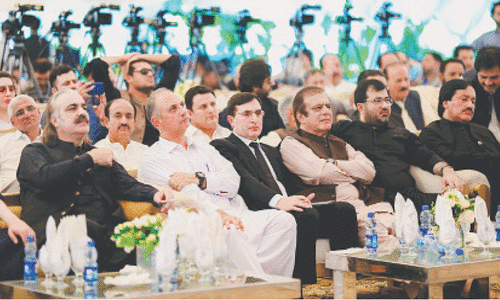• Short order says Article 63-A protects rights of a parliamentary party, not of defectors
• Dissenting note says 63-A is complete code in itself, further interpretation amounts to rewriting Constitution
ISLAMABAD: The Supreme Court on Tuesday declared by a majority verdict of three to two that votes cast by legislators in violation of their party’s stance must not be taken into account while determining the outcome of a motion since Article 63-A of the Constitution was meant to protect the fundamental rights of a parliamentary party, and not those of defectors.
“Political parties are an integral aspect of the bedrock on which our democracy rests. Their destabilisation tends to shake the bedrock, which can potentially put democracy itself in peril,” Chief Justice of Pakistan Umar Ata Bandial read out the short judgement on the presidential reference about 26 members of the Pakistan Tehreek-i-Insaf who voted against their party line in the Punjab Assembly during the chief minister’s election last month.
The apex court will release a detailed judgement later.
The Supreme Court preferred not to answer a question about the applicability of Article 63-A — perpetual disqualification — if a member is found guilty of defection.
Justice Mazhar Alam Miankhel and Justice Jamal Khan Mandokhel did not agree with the opinion of the three other judges. They observed that Article 63-A was a complete code in itself and spells out a comprehensive procedure regarding defection of a member of parliament and its consequences.
In case the Election Commission of Pakistan (ECP) confirms the declaration sent by a party head against a member, the member will cease to be a legislator and his/her seat will become vacant.
A right of appeal to the Supreme Court has been provided under sub-Article 63-A(5) if a party feels aggrieved by the ECP decision, the dissenting note said.
Any further interpretation of Article 63-A would amount to rewriting or reading something into the Constitution and would affect other provisions of the statute, the two judges said.
They added there was no force in the questions asked through the presidential reference. However, if parliament deems appropriate, it may impose further restrictions on the defectors, the dissenting note said.
The announcement of the judgement set off a flurry of political activities. Prime Minister Shehbaz Sharif and his allies put their heads together to review the judgement and its probable consequences while former premier Imran Khan thanked the apex court at a public meeting in Kohat.
The judgement threw up questions about the fate of the federal and provincial governments. Mustafa Ramday, a prominent lawyer, suggested that the opinion would have a “prospective effect” and not a “retrospective” one. “Hence elections already conducted are safe, for the time being,” he said while talking to Dawn.
But in case the Punjab governor, whose office is presently vacant, asks Chief Minister Punjab Hamza Shehbaz to seek a fresh vote of confidence, the provincial government would be in trouble since it was elected with the support of 26 PTI MPAs who voted contrary to their party line during the election for Leader of the House in Punjab Assembly, Mr Ramday said.
Hamza Shehbaz was elected to the highest office with 197 votes — 11 more than the 186 needed in a house of 371. But since the tally included votes of the 26 PTI defectors, Mr Hamza’s would lose majority in line with the latest apex court verdict.
The unbridled powers of members, in the National Assembly as well as all provincial legislatures, have been taken away through this opinion, Mr Ramday said.
“The Supreme Court has changed the scheme of the Constitution entirely since now legislators won’t be able to vote out the prime minister in exercise of powers under Article 95. “The head of a political party will now enjoy unbridled powers. In fact, the Leader of the House in the National Assembly (prime minister) will now not be hampered by checks and balances, Mustafa Ramday added.
“The concept of an elected dictator has been further fortified.”
Another lawyer was of the view that the PML-N had now lost the “moral and constitutional right to govern”.
Had the court’s decision come a few weeks earlier, a national catastrophe could have been averted, he observed.
Senior counsel Hafiz Ahsaan Ahmad Khokhar said the defection by a member would not affect the vote count until it was determined through a legal process spelt out in Article 63-A.
He said it was now probable that the votes would not be counted of those MPAs who voted for Hamza Shehbaz in violation of the PTI’s instructions.
Mr Hamza’s strength would come down to 171 after the 26 defectors’ votes were excluded while he needs 186 for a simple majority, Mr Khokhar said.
“If no one in the National Assembly and provincial assemblies is able to muster the number of votes required for a simple majority, the prime minister, as well as the chief minister concerned, will not be able to stay in office. And the legislature in question will stand dissolved.”
Published in Dawn, May 18th, 2022















































